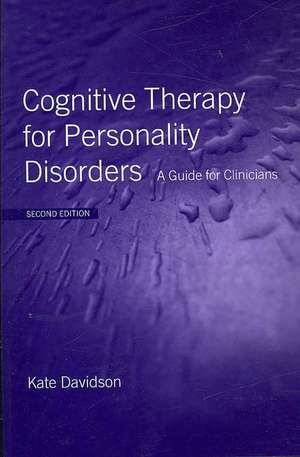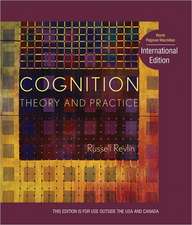Cognitive Therapy for Personality Disorders: A Guide for Clinicians
Autor Kate Davidsonen Limba Engleză Paperback – 24 aug 2007
Cognitive Therapy for Personality Disorders provides a thorough description of how to apply cognitive behavioural therapy to patients who are traditionally regarded as being difficult to treat: those with borderline personality disorders and those with antisocial personality disorders. The book contains detailed descriptions and strategies of how to:
- formulate a case within the cognitive model of personality disorders
- overcome problems encountered when treating personality disordered patients
- understand how therapy may develop over a course of treatment.
Preț: 301.88 lei
Preț vechi: 317.76 lei
-5% Nou
Puncte Express: 453
Preț estimativ în valută:
57.78€ • 62.79$ • 48.57£
57.78€ • 62.79$ • 48.57£
Carte tipărită la comandă
Livrare economică 21 aprilie-05 mai
Preluare comenzi: 021 569.72.76
Specificații
ISBN-13: 9780415415583
ISBN-10: 0415415586
Pagini: 208
Ilustrații: 39 black & white line drawings
Dimensiuni: 156 x 234 x 11 mm
Greutate: 0.34 kg
Ediția:Revised
Editura: Taylor & Francis
Colecția Routledge
Locul publicării:Oxford, United Kingdom
ISBN-10: 0415415586
Pagini: 208
Ilustrații: 39 black & white line drawings
Dimensiuni: 156 x 234 x 11 mm
Greutate: 0.34 kg
Ediția:Revised
Editura: Taylor & Francis
Colecția Routledge
Locul publicării:Oxford, United Kingdom
Public țintă
Postgraduate, Professional, and Professional Practice & DevelopmentCuprins
Introduction. What is Personality Disorder? The Cognitive Model of Personality Disorder. Key Characteristics of Cognitive Therapy for Personality Disorders. Basic Structure and Style of Cognitive Therapy for Personality Disorders. Arriving at a Formulation. Identifying Core Beliefs. Changing Core Beliefs. Typical Behavioural Problems: Antisocial Personality Disorder. Typical Behavioural Problems: Borderline Personality Disorder. Clinical Evaluation of Change. Ending Treatment. Therapy in Action: A Case Illustration of Antisocial Personality Disorder. Therapy in Action: A Case Illustration of Borderline Personality Disorder.
Recenzii
"Kate Davidson brings a wealth of clinical experience to this concise guide, which conveys a sense of clarity and sound, practical advice. The sections on antisocial and borderline personality types, and the detailed case studies and therapy extracts, ensure that cognitive therapists will feel better prepared and more confident for work with clients with complex problems." - Ken Gordon, Consultant Clinical Psychologist, Hampshire Partnership Trust, UK
"Cognitive Therapy for Personality Disorders has proven and invaluable resource for our Specialist Personality Disorders Recovery Team. We regularly reach for it during CBT supervision sessions and case discussions as a quick refresher for our practice. However, Davidson’s audience need not be limited to clinicians with such specific clientele. This text would also serve as an appropriate starting point for CBT therapists or clinical trainees who wish to expand their expertise to work with clients with personality disorders." – Shelley L. Kerr, The Journal of Behavioural and Cognitive Psychotherapy, Vol. 39, 2011
"Cognitive Therapy for Personality Disorders has proven and invaluable resource for our Specialist Personality Disorders Recovery Team. We regularly reach for it during CBT supervision sessions and case discussions as a quick refresher for our practice. However, Davidson’s audience need not be limited to clinicians with such specific clientele. This text would also serve as an appropriate starting point for CBT therapists or clinical trainees who wish to expand their expertise to work with clients with personality disorders." – Shelley L. Kerr, The Journal of Behavioural and Cognitive Psychotherapy, Vol. 39, 2011
Descriere
This book provides a thorough description of how to apply cognitive behavioural therapy to patients who are traditionally regarded as being difficult to treat; those with borderline personality disorders and with antisocial personality disorders.














